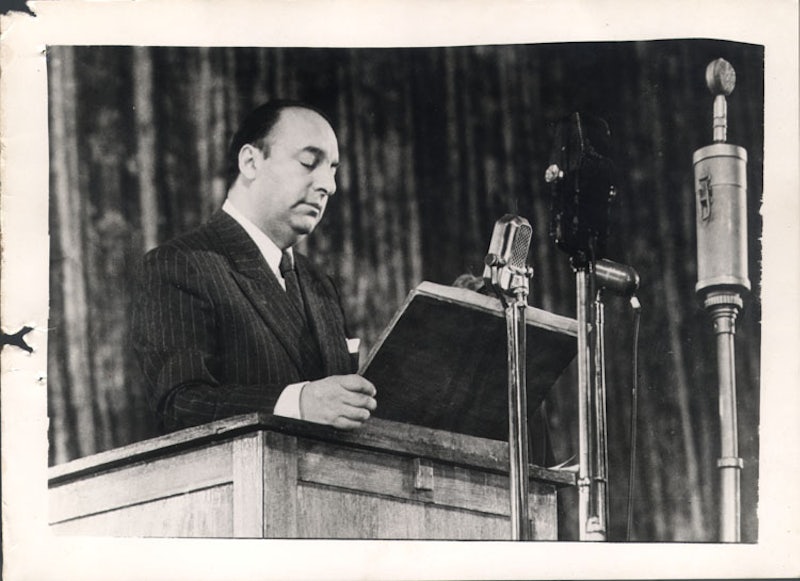 |
| Nate Amadan and Robin Merrill of Port Veritas lead a second poetry workshop on extended metaphor with AP English students. |
Robin asked the class, what do you think this poem is about? One student said, the speaker is "comparing brooms to his hands...maybe he's talking about hardship of some kind."
Robin noticed that the speaker had chances, but didn't follow through with them. She added, what might he have wished he did during his life?
 |
| One of the poets we read today: Pablo Neruda, author of "Guilty." |
One student said, "Maybe he didn't make the life that he wanted."
Robin replied, "Because he's a poet, I think he's talking about a poem. Perhaps not making the poem that he wanted."
I asked, "how do you know it's safe to assume that the speaker and the poet are the same person?"
Robin agreed that we can't say these two figures are the same, adding, "the speaker is saying we shouldn't die without making something (e.g., a broom)."
Like yesterday, we learned that "metaphor allows you to write in code" in a way that is safer if you can't explicitly write about something. Sometimes, there are things that are too hard to write about (love, hate, war), but if you pick something small to represent the war, you can represent it in poetry.
One literary device we discussed was the volta—a device that creates a sharp turn in a sonnet at the end.
Other readings: "The Puppy" by former Maine state Poet Laureate, Wesley McNair.
Writing Activity:
Today's goal is to work on writing extended metaphors.
Prompt 1: Pick something fascinating, small and specific that you can write about in detail such as "catfish" or "granite" or an "apple" or a "puppy." Don't even think about what it might represent because then you will start to force the metaphor. You will come to class with a poem about a specific topic and read it, and we will decide if it is a metaphor for something. So, if you write a poem about a spoon, and we hear it and think it is about heartbreak you might say, "I didn't know it was about heartbreak!"
The goal is to write and then see, upon reflecting on it, if it represents something.
Prompt 2: Pick a giant idea that is impossible to explain such as peace, love, hope, faith. It could also be something more localized like, "living on an island," or "dealing with bullying"; it doesn't have to be universal. Then, think about something small that you ca use to represent it. You can say, "living on an island is like living in a fishbowl."
Neither of these prompts have to be long or "good." You just need to write.

No comments:
Post a Comment
Note: Only a member of this blog may post a comment.